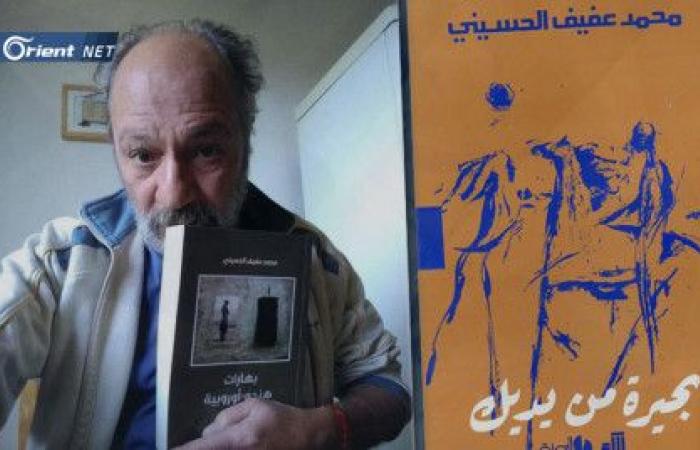
The Syrian cultural circles mourned the Syrian poet Muhammad Afif Al-Husseini, who passed away yesterday from (65) in Sweden, to which he immigrated since 1989. The poet Faraj Bayrakdra on his Facebook page said:
“Muhammad Afif Al-Husseini is a poet in language and in life. He was wronged by critics, oppressed by circumstances, and wronged by himself. For his calm and peaceful soul.”
Childhood books and poverty
Muhammad Afif Al-Husseini was born in the Syrian city of Amuda in 1957 to a Kurdish immigrant family from Diyarbakir.
I was born into an environment that is a mixture of writing ethnicities, religion, and a fond memory of languages. I found myself caught between two things: books and poverty. Books are the daily spice of memory, and poverty is the naughty spice of childhood that prevents us from feeling the sumptuous sense of these books. Wherever I moved from the homes of the parents, it was the books that escaped from the walls, the books that the Argentine fantasy “Borges” was talking about, while he was in his blindness. Birth, then crawling, then suddenly find yourself in the presence of the poles: Mullah Jaziri, Al-Mutanabbi (the classic Arab fascist), Ibn Al-Farid, the endless texts of books that record the painful biography of writing.
We wrote in Arabic about the resurrection of the Kurds!
And about his poetic generation, who wrote not in Arabic but in Arabic, he says:
“I belong to a lost generation of Kurdish poetry: we wrote in Arabic about the resurrection of the Kurds. And my soul always remained, turning around because I could write in my own language, but, I have not done so yet, because I am afraid that the Kurdish language will take me to a border where I am not good at. I started writing about two decades ago, and I found that writing for me is the savior from the misguidance of Arabization, and the life-cruelty of the people of Amuda. I did not write, to find my name in the cauldron of quick thinness, I wrote, to know myself first, and to know a simple meaning, for a simple question: Where shall I bed for my guests–guests of fate, what I think is worth writing?’
Al-Husseini had previously published his first book: (A Lake from Your Hands) in 1993; After that, he issued the poetic collections: “The Men,” “The Gutenberg Metaphor,” and “Nadim Al-Awal,” as well as “The Wednesday Side,” which he considered novelistic fragments.
And in 2018, he issued a book entitled: (Coulson), and he defined it on the last cover as: “A poetic autobiography, written in fifteen life movements, which are the comprehensive paragraphs of the recombinant book in the thin thread of a failed love par excellence. A poetic historical account of a few ethnicities, messengers, and people immersed in exile, heresy, departure and homelessness.
The Kurdish Question and Indo-European Spices
As for his latest publication, it is the book (Indo-European Spices), which was published by Dar (Henn) in Cairo in 2020. The author dedicated his huge book, which is located in more than five hundred pages, to the memory of his parents: Sheikh Afif Al-Husseini and Sheikha Badriya Al-Husseini.. It was His father is an allama and jurist published in the famous Egyptian magazine (Al-Resalah) for its owner Ahmed Hassan Al-Zayat.
In that book, Muhammad Afif al-Husseini sought to present a comprehensive biography of time, place, people, events, birds, plants, spices, animals, and all who lived on the land of Kurdistan that he dreamed of. Qassemlou, Sharaf Khan Al-Badlisi, Yilmaz Kony, Berah Merd, Mah Sharaf Khan and others.. Nor did he save his interests from those who saw that they sympathized with his Kurdish cause, such as the German journalist and researcher Konter Deschner (author of the book: The Descendants of Salah al-Din: The People Being Betrayed and Treachery) ‘), and British journalists Harvey Morris and John Pluge (authors of No Friends But Mountains: The Tragic History of the Kurds).
It is noteworthy that Muhammad Afif Al-Husseini had published for years a magazine on Kurdish literature entitled (Jeljama), and from the atmosphere of his first book (A Lake from Your Hands), published by Daz Azman in Amman in 1993, we read:
“I am the sad violin for you
In the wind I bow
As absent men
The hours tremble from them
And the smell of my mother
Broken violins on my grave
Withered roses from your hands
Shepherds watching the sunset
Their fingers are polluted by the wind
Musicians and their dead instruments
Like me”.
Tags: departure Syrian poet Muhammad Afif AlHusseini wrote Arabic Resurrection Kurds AlMutanabbi fascist

